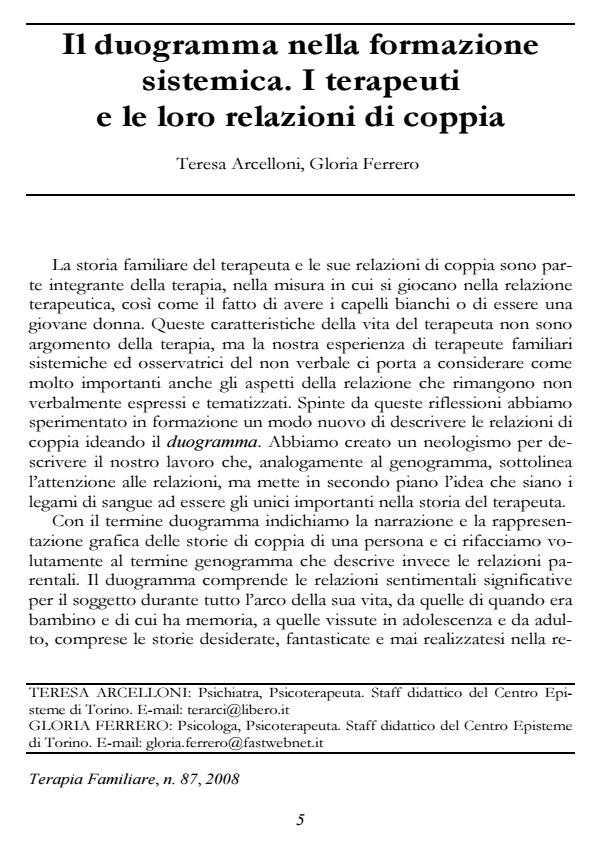Il duogramma nella formazione sistemica. I terapeuti e le loro relazioni di coppia
Titolo Rivista TERAPIA FAMILIARE
Autori/Curatori Teresa Arcelloni, Gloria Ferrero
Anno di pubblicazione 2008 Fascicolo 2008/87
Lingua Italiano Numero pagine 23 P. 5-27 Dimensione file 256 KB
DOI
Il DOI è il codice a barre della proprietà intellettuale: per saperne di più
clicca qui
Qui sotto puoi vedere in anteprima la prima pagina di questo articolo.
Se questo articolo ti interessa, lo puoi acquistare (e scaricare in formato pdf) seguendo le facili indicazioni per acquistare il download credit. Acquista Download Credits per scaricare questo Articolo in formato PDF

FrancoAngeli è membro della Publishers International Linking Association, Inc (PILA), associazione indipendente e non profit per facilitare (attraverso i servizi tecnologici implementati da CrossRef.org) l’accesso degli studiosi ai contenuti digitali nelle pubblicazioni professionali e scientifiche.
Il duogramma nella formazione sistemica. I terapeuti e le loro relazioni di coppia - Purpose of this article is to focus on the relational aspects of the therapist’s loving links: the duogram. The duogram is a new way to describe the affective relationships and it is used in the training sessions for systemic psychotherapists; a neologism was created to point out that, as well as the genogram, it takes care of relationships, but sends to back the idea that only blood ties are important in the therapist’s life. Duogram means the narration and graphical visualization of one person’s loving stories and it recalls the genogram, that actually describes the blood ties. The duogram involves all the affective relationships that were important for the person in his whole life; since he was a child and he can remind them, up to his adolescence and adult life. Wished and dreamed stories are included, even if the feelings were not disclosed or returned. Duogram is therefore the personal representation of our own affective relationships and it refers to the loving links we had with people of our own or the other sex, other than the blood ties that are described by the genogram. During the systemic training sessions, the therapist’s family relationships are widely explored, but his experiences outside the family habitat are not properly taken into account. With this article, the authors wish to move the attention on this point: on the therapist and his role in the loving links he lived in the past and he is living nowadays. This is a way to better manage a couple therapy as well as an individual systemic therapy seen as a relational therapy. This article is focused on the duogram as a training tool and its meaning and usefulness for the new therapists and the whole group of people that is sharing the training session.
Teresa Arcelloni, Gloria Ferrero, Il duogramma nella formazione sistemica. I terapeuti e le loro relazioni di coppia in "TERAPIA FAMILIARE" 87/2008, pp 5-27, DOI: